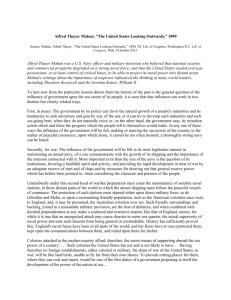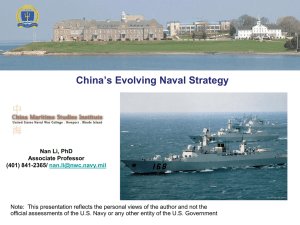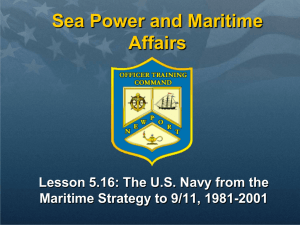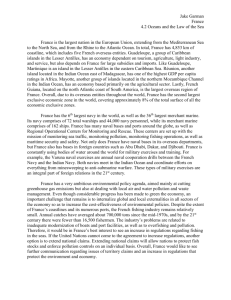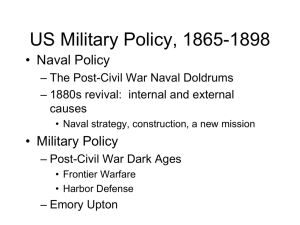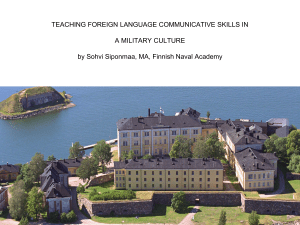naval vs. military—mahan
advertisement
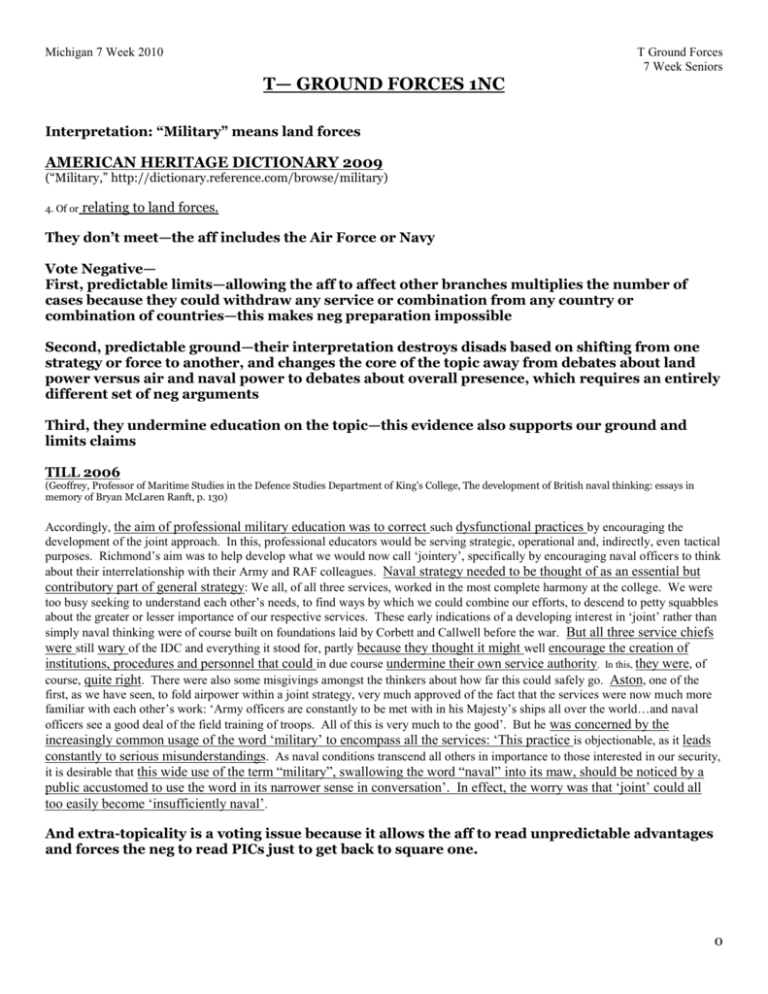
Michigan 7 Week 2010 T Ground Forces 7 Week Seniors T— GROUND FORCES 1NC Interpretation: “Military” means land forces AMERICAN HERITAGE DICTIONARY 2009 (“Military,” http://dictionary.reference.com/browse/military) 4. Of or relating to land forces. They don’t meet—the aff includes the Air Force or Navy Vote Negative— First, predictable limits—allowing the aff to affect other branches multiplies the number of cases because they could withdraw any service or combination from any country or combination of countries—this makes neg preparation impossible Second, predictable ground—their interpretation destroys disads based on shifting from one strategy or force to another, and changes the core of the topic away from debates about land power versus air and naval power to debates about overall presence, which requires an entirely different set of neg arguments Third, they undermine education on the topic—this evidence also supports our ground and limits claims TILL 2006 (Geoffrey, Professor of Maritime Studies in the Defence Studies Department of King's College, The development of British naval thinking: essays in memory of Bryan McLaren Ranft, p. 130) Accordingly, the aim of professional military education was to correct such dysfunctional practices by encouraging the development of the joint approach. In this, professional educators would be serving strategic, operational and, indirectly, even tactical purposes. Richmond’s aim was to help develop what we would now call ‘jointery’, specifically by encouraging naval officers to think about their interrelationship with their Army and RAF colleagues. Naval strategy needed to be thought of as an essential but contributory part of general strategy: We all, of all three services, worked in the most complete harmony at the college. We were too busy seeking to understand each other’s needs, to find ways by which we could combine our efforts, to descend to petty squabbles about the greater or lesser importance of our respective services. These early indications of a developing interest in ‘joint’ rather than simply naval thinking were of course built on foundations laid by Corbett and Callwell before the war. But all three service chiefs were still wary of the IDC and everything it stood for, partly because they thought it might well encourage the creation of institutions, procedures and personnel that could in due course undermine their own service authority. In this, they were, of course, quite right. There were also some misgivings amongst the thinkers about how far this could safely go. Aston, one of the first, as we have seen, to fold airpower within a joint strategy, very much approved of the fact that the services were now much more familiar with each other’s work: ‘Army officers are constantly to be met with in his Majesty’s ships all over the world…and naval officers see a good deal of the field training of troops. All of this is very much to the good’. But he was concerned by the increasingly common usage of the word ‘military’ to encompass all the services: ‘This practice is objectionable, as it leads constantly to serious misunderstandings. As naval conditions transcend all others in importance to those interested in our security, it is desirable that this wide use of the term “military”, swallowing the word “naval” into its maw, should be noticed by a public accustomed to use the word in its narrower sense in conversation’. In effect, the worry was that ‘joint’ could all too easily become ‘insufficiently naval’. And extra-topicality is a voting issue because it allows the aff to read unpredictable advantages and forces the neg to read PICs just to get back to square one. 0 Michigan 7 Week 2010 T Ground Forces 7 Week Seniors 2NC OVERVIEW—ONLY LAND FORCES The word “military” means the aff can only withdraw ground troops. First, this makes the topic impossibly large—the aff can withdraw any service from any country, or any combination of services and countries, or even any combination of units and countries— this makes the topic many times larger than it should be and also shifts the focus away from arguments about military strategy to arguments about whether the United States should maintain any kind of presence at all, which we shouldn’t have to be prepared for. Second, this is critical to negative ground because our strategies are predicated on arguments about the nuances about American military deployment, like air power versus forward deployment, or shift claims—their interpretation allows the aff to fiat out of our core ground. Third, this undermines topic education—the word “military” should be distinguished from naval and air power because understanding deployment strategy requires that we make such distinctions. Education claims might usually seem arbitrary but we have evidence to support this claim, which is our Till 2006 card in the 1nc. This outweighs ground and fairness claims because topic education is the reason we debate in the first place. And, it’s critical to public discourse on military issues, which solves war and democracy. HANSON 2007 (Victor Davis Hanson, Professor of Classics at CSU Fullerton, “Why Study War?” City Journal, Summer) It’s no surprise that civilian Americans tend to lack a basic understanding of military matters. Even when I was a graduate student, 30-some years ago, military history—understood broadly as the investigation of why one side wins and another loses a war, and encompassing reflections on magisterial or foolish generalship, technological stagnation or breakthrough, and the roles of discipline, bravery, national will, and culture in determining a conflict’s outcome and its consequences—had already become unfashionable on campus. Today, universities are even less receptive to the subject. This state of affairs is profoundly troubling, for democratic citizenship requires knowledge of war—and now, in the age of weapons of mass annihilation, more than ever. I came to the study of warfare in an odd way, at the age of 24. Without ever taking a class in military history, I naively began writing about war for a Stanford classics dissertation that explored the effects of agricultural devastation in ancient Greece, especially the Spartan ravaging of the Athenian countryside during the Peloponnesian War. The topic fascinated me. Was the strategy effective? Why assume that ancient armies with primitive tools could easily burn or cut trees, vines, and grain on thousands of acres of enemy farms, when on my family farm in Selma, California, it took me almost an hour to fell a mature fruit tree with a sharp modern ax? Yet even if the invaders couldn’t starve civilian populations, was the destruction still harmful psychologically? Did it goad proud agrarians to come out and fight? And what did the practice tell us about the values of the Greeks—and of the generals who persisted in an operation that seemingly brought no tangible results? I posed these questions to my prospective thesis advisor, adding all sorts of further justifications. The topic was central to understanding the Peloponnesian War, I noted. The research would be interdisciplinary—a big plus in the modern university—drawing not just on ancient military histories but also on archaeology, classical drama, epigraphy, and poetry. I could bring a personal dimension to the research, too, having grown up around veterans of both world wars who talked constantly about battle. And from my experience on the farm, I wanted to add practical details about growing trees and vines in a Mediterranean climate. Yet my advisor was skeptical. Agrarian wars, indeed wars of any kind, weren’t popular in classics Ph.D. programs, even though farming and fighting were the ancient Greeks’ two most common pursuits, the sources of anecdote, allusion, and metaphor in almost every Greek philosophical, historical, and literary text. Few classicists seemed to care any more that most notable Greek writers, thinkers, and statesmen—from Aeschylus to Pericles to Xenophon—had served in the phalanx or on a trireme at sea. Dozens of nineteenthcentury dissertations and monographs on ancient warfare—on the organization of the Spartan army, the birth of Greek tactics, the strategic thinking of Greek generals, and much more—went largely unread. Nor was the discipline of military history, once central to a liberal education, in vogue on campuses in the seventies. It was as if the university had forgotten that history itself had begun with Herodotus and Thucydides as the story of armed conflicts. What lay behind this academic lack of interest? The most obvious explanation: this was the immediate post-Vietnam era. The public perception in the Carter years was that America had lost a war that for moral and practical reasons it should never have fought—a catastrophe, for many in the universities, that it must never repeat. The necessary corrective wasn’t to learn how such wars started, went forward, and were lost. Better to ignore anything that had to do with such odious business in the first place. The nuclear pessimism of the cold war, which followed the horror of two world wars, also dampened academic interest. The postwar obscenity of Mutually Assured Destruction had lent an apocalyptic veneer to contemporary war: as President Kennedy warned, “Mankind must put an end to war, or war will put an end to mankind.” Conflict had become something so destructive, in this view, that it no longer had any relation to the battles of the past. It seemed absurd to worry about a new tank or a novel doctrine of counterinsurgency when the press of a button, unleashing nuclear Armageddon, would render all military thinking superfluous. Further, the sixties had ushered in a utopian view of society antithetical to serious thinking about war. Government, the military, business, religion, and the family had conspired, the new Rousseauians believed, to warp the naturally peace-loving individual. Conformity and coercion smothered our innately pacifist selves. To assert that wars broke out because bad men, in fear or in pride, sought material advantage or status, or because good men had done too little to stop them, was now seen as antithetical to an enlightened understanding of human nature. “What difference does it make,” in the words of the much-quoted Mahatma Gandhi, “to the dead, the orphans, and the homeless whether the mad destruction is wrought under the name of totalitarianism or the holy name of liberty and democracy?” The academic neglect of war is even more acute today. Military history as a discipline has atrophied, with very few professorships, journal articles, or degree programs. In 2004, Edward Coffman, a retired military history professor who taught at the University of Wisconsin, reviewed the faculties of the top 25 history departments, as ranked by U.S. News and World Report. He found that of over 1,000 professors, only 21 identified war as a specialty. When war does show up on university syllabi, it’s often about the race, class, and gender of combatants and wartime civilians. So a class on the Civil War will focus on the Underground Railroad and Reconstruction, not on Chancellorsville and Gettysburg. One on World War II might emphasize Japanese internment, Rosie the Riveter, and the horror of Hiroshima, not Guadalcanal and Midway. A survey of the Vietnam War will devote lots of time to the inequities of the draft, media coverage, and the antiwar movement at home, and scant the air and artillery barrages at Khe Sanh. Those who want to study war in the traditional way face intense academic suspicion, as Margaret Atwood’s poem “The Loneliness of the Military Historian” suggests: Confess: it’s my 1 Michigan 7 Week 2010 T Ground Forces 7 Week Seniors profession that alarms you. This is why few people ask me to dinner, though Lord knows I don’t go out of my way to be scary. Historians of war must derive perverse pleasure, their critics suspect, from reading about carnage and suffering. Why not figure out instead how to outlaw war forever, as if it were not a tragic, nearly inevitable aspect of human existence? Hence the recent surge of “peace studies” (see “The Peace Racket”). The university’s aversion to the study of war certainly doesn’t reflect public lack of interest in the subject. Students love old-fashioned war classes on those rare occasions when they’re offered, usually as courses that professors sneak in when the choice of what to teach is left up to them. I taught a number of such classes at California State University, Stanford, and elsewhere. They’d invariably wind up overenrolled, with hordes of students lingering after office hours to offer opinions on the battles of Marathon and Lepanto. Popular culture, too, displays extraordinary enthusiasm for all things military. There’s a new Military History Channel, and Hollywood churns out a steady supply of blockbuster war movies, from Saving Private Ryan to 300. The post–Ken Burns explosion of interest in the Civil War continues. Historical reenactment societies stage history’s great battles, from the Roman legions’ to the Wehrmacht’s. Barnes and Noble and Borders bookstores boast well-stocked military history sections, with scores of new titles every month. A plethora of websites obsess over strategy and tactics. Hit video games grow ever more realistic in their reconstructions of battles. The public may feel drawn to military history because it wants to learn about honor and sacrifice, or because of interest in technology—the muzzle velocity of a Tiger Tank’s 88mm cannon, for instance—or because of a pathological need to experience violence, if only vicariously. The importance—and challenge—of the academic study of war is to elevate that popular enthusiasm into a more capacious and serious understanding, one that seeks answers to such questions as: Why do wars break out? How do they end? Why do the winners win and the losers lose? How best to avoid wars or contain their worst effects? A wartime public illiterate about the conflicts of the past can easily find itself paralyzed in the acrimony of the present. Without standards of historical comparison, it will prove ill equipped to make informed judgments. Neither our politicians nor most of our citizens seem to recall the incompetence and terrible decisions that, in December 1777, December 1941, and November 1950, led to massive American casualties and, for a time, public despair. So it’s no surprise that today so many seem to think that the violence in Iraq is unprecedented in our history. Roughly 3,000 combat dead in Iraq in some four years of fighting is, of course, a terrible thing. And it has provoked national outrage to the point of considering withdrawal and defeat, as we still bicker over up-armored Humvees and proper troop levels. But a previous generation considered Okinawa a stunning American victory, and prepared to follow it with an invasion of the Japanese mainland itself—despite losing, in a little over two months, four times as many Americans as we have lost in Iraq, casualties of faulty intelligence, poor generalship, and suicidal head-on assaults against fortified positions. It’s not that military history offers cookie-cutter comparisons with the past. Germany’s World War I victory over Russia in under three years and her failure to take France in four apparently misled Hitler into thinking that he could overrun the Soviets in three or four weeks—after all, he had brought down historically tougher France in just six. Similarly, the conquest of the Taliban in eight weeks in 2001, followed by the establishment of constitutional government within a year in Kabul, did not mean that the similarly easy removal of Saddam Hussein in three weeks in 2003 would ensure a working Iraqi democracy within six months. The differences between the countries—cultural, political, geographical, and economic—were too great. Instead, knowledge of past wars establishes wide parameters of what to expect from new ones. Themes, emotions, and rhetoric remain constant over the centuries, and thus generally predictable. Athens’s disastrous expedition in 415 BC against Sicily, the largest democracy in the Greek world, may not prefigure our war in Iraq. But the story of the Sicilian calamity does instruct us on how consensual societies can clamor for war—yet soon become disheartened and predicate their support on the perceived pulse of the battlefield. Military history teaches us, contrary to popular belief these days, that wars aren’t necessarily the most costly of human calamities. The first Gulf War took few lives in getting Saddam out of Kuwait; doing nothing in Rwanda allowed savage gangs and militias to murder hundreds of thousands with impunity. Hitler, Mao, Pol Pot, and Stalin killed far more off the battlefield than on it. The 1918 Spanish flu epidemic brought down more people than World War I did. And more Americans—over 3.2 million—lost their lives driving over the last 90 years than died in combat in this nation’s 231-year history. Perhaps what bothers us about wars, though, isn’t just their horrific lethality but also that people choose to wage them—which makes them seem avoidable, unlike a flu virus or a car wreck, and their tolls unduly grievous. Yet military history also reminds us that war sometimes has an eerie utility: as British strategist Basil H. Liddell Hart put it, “War is always a matter of doing evil in the hope that good may come of it.” Wars—or threats of wars— put an end to chattel slavery, Nazism, fascism, Japanese militarism, and Soviet Communism. Military history is as often the story of appeasement as of warmongering. The destructive military careers of Alexander the Great, Caesar, Napoleon, and Hitler would all have ended early had any of their numerous enemies united when the odds favored them. Western air power stopped Slobodan Milošević’s reign of terror at little cost to NATO forces—but only after a near-decade of inaction and dialogue had made possible the slaughter of tens of thousands. Affluent Western societies have often proved reluctant to use force to prevent greater future violence. “War is an ugly thing, but not the ugliest of things,” observed the British philosopher John Stuart Mill. “The decayed and degraded state of moral and patriotic feeling which thinks that nothing is worth war is much worse.” Indeed, by ignoring history, the modern age is free to interpret war as a failure of communication, of diplomacy, of talking— as if aggressors don’t know exactly what they’re doing. Speaker of the House Nancy Pelosi, frustrated by the Bush administration’s intransigence in the War on Terror, flew to Syria, hoping to persuade President Assad to stop funding terror in the Middle East. She assumed that Assad’s belligerence resulted from our aloofness and arrogance rather than from his dictatorship’s interest in destroying democracy in Lebanon and Iraq, before such contagious freedom might in fact destroy him. For a therapeutically inclined generation raised on Oprah and Dr. Phil—and not on the letters of William Tecumseh Sherman and William Shirer’s Berlin Diary—problems between states, like those in our personal lives, should be argued about by equally civilized and peaceful rivals, and so solved without resorting to violence. Yet it’s hard to find many wars that result from miscommunication. Far more often they break out because of malevolent intent and the absence of deterrence. Margaret Atwood also wrote in her poem: “Wars happen because the ones who start them / think they can win.” Hitler did; so did Mussolini and Tojo—and their assumptions were logical, given the relative disarmament of the Western democracies at the time. Bin Laden attacked on September 11 not because there was a dearth of American diplomats willing to dialogue with him in the Hindu Kush. Instead, he recognized that a series of Islamic terrorist assaults against U.S. interests over two decades had met with no meaningful reprisals, and concluded that decadent Westerners would never fight, whatever the provocation—or that, if we did, we would withdraw as we had from Mogadishu. In the twenty-first century, it’s easier than ever to succumb to technological determinism, the idea that science, new weaponry, and globalization have altered the very rules of war. But military history teaches us that our ability to strike a single individual from 30,000 feet up with a GPS bomb or a jihadist’s efforts to have his propaganda beamed to millions in real time do not necessarily transform the conditions that determine who wins and who loses wars. True, instant communications may compress decision making, and generals must be skilled at news conferences that can now influence the views of millions worldwide. Yet these are really just new wrinkles on the old face of war. The improvised explosive device versus the up-armored Humvee is simply an updated take on the catapult versus the stone wall or the harquebus versus the mailed knight. The long history of war suggests no static primacy of the defensive or the offensive, or of one sort of weapon over the other, but just temporary advantages gained by particular strategies and technologies that go unanswered for a time by less adept adversaries. So it’s highly doubtful, the study of war tells us, that a new weapon will emerge from the Pentagon or anywhere else that will change the very nature of armed conflict—unless some sort of genetic engineering so alters man’s brain chemistry that he begins to act in unprecedented ways. We fought the 1991 Gulf War with dazzling, computer-enhanced weaponry. But lost in the technological pizzazz was the basic wisdom that we need to fight wars with political objectives in mind and that, to conclude them decisively, we must defeat and even humiliate our enemies, so that they agree to abandon their prewar behavior. For some reason, no American general or diplomat seemed to understand that crucial point 16 years ago, with the result that, on the cessation of hostilities, Saddam Hussein’s supposedly defeated generals used their gunships to butcher Kurds and Shiites while Americans looked on. And because we never achieved the war’s proper aim—ensuring that Iraq would not use its petro-wealth to destroy the peace of the region—we have had to fight a second war of no-fly zones, and then a third war to remove Saddam, and now a fourth war, of counterinsurgency, to protect the fledgling Iraqi democracy. Military history reminds us of important anomalies and paradoxes. When Sparta invaded Attica in the first spring of the Peloponnesian war, Thucydides recounts, it expected the Athenians to surrender after a few short seasons of ravaging. They didn’t—but a plague that broke out unexpectedly did more damage than thousands of Spartan ravagers did. Twenty-seven years later, a maritime Athens lost the war at sea to Sparta, an insular land power that started the conflict with scarcely a navy. The 2003 removal of Saddam refuted doom-and-gloom critics who predicted thousands of deaths and millions of refugees, just as the subsequent messy four-year reconstruction hasn’t evolved as anticipated into a quiet, stable democracy—to say the least. The size of armies doesn’t guarantee battlefield success: the victors at Salamis, Issos, Mexico City, and Lepanto were all outnumbered. War’s most savage moments—the Allied summer offensive of 1918, the Russian siege of Berlin in the spring of 1945, the Battle of the Bulge, Hiroshima—often unfold right before hostilities cease. And democratic leaders during war—think of Winston Churchill, Harry Truman, and Richard Nixon—often leave office either disgraced or unpopular. It would be reassuring to think 2 Michigan 7 Week 2010 T Ground Forces 7 Week Seniors that the righteousness of a cause, or the bravery of an army, or the nobility of a sacrifice ensures public support for war. But military history shows that far more often the perception of winning is what matters. Citizens turn abruptly on any leaders deemed culpable for losing. “Public sentiment is everything,” wrote Abraham Lincoln. “With public sentiment nothing can fail. Without it nothing can succeed. He who molds opinion is greater than he who enacts laws.” Lincoln knew that lesson well. Gettysburg and Vicksburg were brilliant Union victories that by summer 1863 had restored Lincoln’s previously shaky credibility. But a year later, after the Wilderness, Spotsylvania, Petersburg, and Cold Harbor battles—Cold Harbor claimed 7,000 Union lives in 20 minutes—the public reviled him. Neither Lincoln nor his policies had changed, but the Confederate ability to kill large numbers of Union soldiers had. Ultimately, public opinion follows the ups and downs—including the perception of the ups and downs—of the battlefield, since victory excites the most ardent pacifist and defeat silences the most zealous zealot. After the defeat of France, the losses to Bomber Command, the U-boat rampage, and the fall of Greece, Singapore, and Dunkirk, Churchill took the blame for a war as seemingly lost as, a little later, it seemed won by the brilliant prime minister after victories in North Africa, Sicily, and Normandy. When the successful military action against Saddam Hussein ended in April 2003, over 70 percent of the American people backed it, with politicians and pundits alike elbowing each other aside to take credit for their prescient support. Four years of insurgency later, Americans oppose a now-orphaned war by the same margin. General George S. Patton may have been uncouth, but he wasn’t wrong when he bellowed, “Americans love a winner and will not tolerate a loser.” The American public turned on the Iraq War not because of Cindy Sheehan or Michael Moore but because it felt that the battlefield news had turned uniformly bad and that the price in American lives and treasure for ensuring Iraqi reform was too dear. Finally, military history has the moral purpose of educating us about past sacrifices that have secured our present freedom and security. If we know nothing of Shiloh, Belleau Wood, Tarawa, and Chosun, the crosses in our military cemeteries are just pleasant white stones on lush green lawns. They no longer serve as reminders that thousands endured pain and hardship for our right to listen to what we wish on our iPods and to shop at Wal-Mart in safety—or that they expected future generations, links in this great chain of obligation, to do the same for those not yet born. The United States was born through war, reunited by war, and saved from destruction by war. No future generation, however comfortable and affluent, should escape that terrible knowledge. What, then, can we do to restore the study of war to its proper place in the life of the American mind? The challenge isn’t just to reform the graduate schools or the professoriate, though that would help. On a deeper level, we need to reexamine the larger forces that have devalued the very idea of military history—of war itself. We must abandon the naive faith that with enough money, education, or good intentions we can change the nature of mankind so that conflict, as if by fiat, becomes a thing of the past. In the end, the study of war reminds us that we will never be gods . We will always just be men, it tells us. Some men will always prefer war to peace; and other men, we who have learned from the past, have a moral obligation to stop them. 3 Michigan 7 Week 2010 T Ground Forces 7 Week Seniors A2: COUNTERINTERPRETATION: MILITARY IS ALL BRANCHES Prefer our interpretation— Predictability—our Till evidence is from a professor of maritime studies who specializes in differences between land and sea warfare. Their evidence is less precise, and ignores a crucial distinction, which our Hansen evidence impacts in war and democracy. Ground—they shift the topic away from arguments like “ground withdrawal causes a shift to air power.” Their interpretation focuses the topic on general US presence instead of nuanced claims about the desirability of one military strategy over another, which both destroys our ground and produces a stale topic. Fairness—their interpretation incentivizes PICs that exclude one branch or even one unit within a single service, like “PIC out of the 51st bomber wing” or “exclude MARFORK.” This is worse for the aff because they can’t read generic disads about withdrawal, but it’s also bad for the neg because the composition of forces is different in each topic country, so we have to develop totally different strategies against each one. And, US federal law distinguishes between “military” and “naval”—prefer this because it’s the most predictable and objective source 18 USC 2387 (http://www.law.cornell.edu/uscode/html/uscode18/usc_sec_18_00002387----000-.html) (b) For the purposes of this section, the term “military or naval forces of the United States” includes the Army of the United States, the Navy, Air Force, Marine Corps, Coast Guard, Navy Reserve, Marine Corps Reserve, and Coast Guard Reserve of the United States; and, when any merchant vessel is commissioned in the Navy or is in the service of the Army or the Navy, includes the master, officers, and crew of such vessel. And, the adjective “military” explicitly excludes the Navy RANDOM HOUSE DICTIONARY 2010 (“Military,” http://dictionary.reference.com/browse/military) –adjective 1. of, for, or pertaining to the army life. or armed forces, often as distinguished from the navy: from civilian to military 4 Michigan 7 Week 2010 T Ground Forces 7 Week Seniors A2: COUNTERINTERPRETATION: ONE BRANCH Prefer our interpretation: Limits—there are six countries and four branches of the armed services—their interpretation allows the aff to withdraw any combination of forces from any combination of countries, which makes the topic huge. We still allow the aff to withdraw the Army either completely or partially, which allows for a diversity of affs but guarantees negative ground based on land force arguments. Ground—forcing the aff to withdraw only ground forces lets us read arguments like air force shift or “ground forces key to containment”—allowing them to withdraw only one service warps our strategies and makes the topic bidirectional—our air force shift disad suddenly becomes a potential aff. Education—ground force strategy is distinct from naval and air strategy—conflating them means we won’t learn the details of strategy, which is our Till evidence. Our Hansen evidence says that proper education about the military is necessary to preserve democracy and prevent war, so our education arguments outweigh their standards. 5 Michigan 7 Week 2010 T Ground Forces 7 Week Seniors A2: MILITARY EDUCATION INEVITABLE First, even if military education is inevitable, their interpretation makes it worse. Specifically in the context of overseas basing, conflating all services with the term “military” glosses over strategic debates like air power versus ground forces. Even if these still occur sometimes, our interpretation guarantees that the topic revolves around them since every aff must reckon with the services which remain in-country after the Army is withdrawn. Second, this is particularly important to understand strategic differences between peace and war, Navy and Army, and the idea of forward deployment—they ignore the best naval thinker of the twentieth century HOLMES AND YOSHIHARA 2009 (Dr. James Holmes and Dr. Toshi Yoshihara are associate professors of strategy at the Naval War College. They are the co-authors of Chinese Naval Strategy in the 21st Century: The Turn to Mahan, USNI Proceedings, December, http://www.usni.org/magazines/proceedings/story.asp?STORY_ID=2123) Alfred Thayer Mahan remains as relevant today in his logic and operational grammar as he was in the 19th century with his doctrines of capital ship and major fleet action. The future of American sea power turns on the U.S. Navy's ability to preserve ready access to East Asia, one of two central theaters for U.S. maritime operations. The other, the Indian Ocean and Persian Gulf, lies off South and Southwest Asian shores. America's strategic gaze is now fixed squarely on maritime Asia.1 But costs are escalating while acquisition budgets are stagnant. The result is inexorable downward pressure on the size of the Fleet. The Sea Services' ability to execute the 2007 Maritime Strategy is, as a result, increasingly in doubt. Meanwhile, the Navy's most likely antagonist, China's People's Liberation Army Navy (PLAN), is on the opposite trajectory. The PLAN has armed itself with a panoply of new ships, submarines, and aircraft. Few would claim that these assets equal their American counterparts on a one-to-one basis, but the Chinese fleet has the luxury of focusing on Asia, whereas the United States has commitments spanning the globe. Washington cannot apply maximum force to any single theater, however important. Quantity matters at vital points—as does proximity to the theater. An antiship ballistic missile (ASBM) reportedly in the works could change the rules of the game altogether, holding off U.S. forces while the Chinese navy pursues its aims in regard to fellow Asian nations.2 ASBM bombardment—or even the threat of it—could dissuade U.S. expeditionary groups from venturing into the region, or cause severe problems if they did. The PLAN would have denied a superior adversary the use of nearby expanses such as the Yellow, East China, and South China seas while positioning itself to exercise sea control. Debates over access take place mainly on the operational, tactical, and force-structure levels. This is understandable. Antiaccess strategy is the most direct way China might attempt to shut America out of its maritime environs, and it is dramatic. For Americans, the image of a flattop engulfed in flames conjures up memories of World War II, the last time U.S. Navy carrier task forces found themselves in mortal jeopardy. (See Proceedings, May 2009.) This concentrates minds. From an operational standpoint, access equates to the ability to force entry into the region despite stubborn resistance. One RAND Corporation study depicts access denial as combined military and nonmilitary measures that delay U.S. and allied forces' arrival in-theater, hinder or prevent those forces from using bases in the region, and keep powerprojection assets as far away as possible.3 This is a working definition of how China might bar entry to its offshore "contested zone," exploiting nearby assets, manpower, and the myriad advantages enjoyed by the home team.4 In short, imaginative strategy could let Beijing defy U.S. forces operating far from home, even while PLAN forces remain second-rate. Easy access to Asia can no longer be taken for granted. Maritime Strategy Beyond Taiwan Western commentary on China's capacity to refuse access to maritime Asia—and especially to the waters and skies adjoining Taiwan—has taken on a bleak timbre. The island's fate is seldom far from the minds of analysts like Thomas Ehrhard and Robert Work (current Under Secretary of the Navy), who prophesy that, "For the first time since the late 1980s, and for only the second time since the end of World War II, U.S. carrier strike forces will soon face a major land-based threat that outranges them" (their emphasis).5 In other words, they rate the Chinese threat as comparable to that posed by the Soviet Union and Imperial Japan, the last to challenge the United States for command of Far Eastern waters. Robert Ross, who once pronounced the U.S. Navy unbeatable, now despairs of America's ability to defend Taiwan.6 Washington policy-makers heed such warnings and, predictably, have come to see Chinese sea power almost wholly in terms of military access denial in the Taiwan Strait. But this misreads Chinese strategy. Assume Beijing is indeed building up access-denial capacity to return Taiwan to mainland rule. Keeping Washington from reprising its 1995-96 intervention in the strait is clearly one touchstone for Chinese antiaccess strategy. China's leadership in effect vowed never again to allow such an act after seeing the Clinton administration dispatch two carrier task forces to the island's vicinity with the Chinese military powerless to do anything about it—or even to detect the intervening forces. A China intent solely on planting the Chinese communist flag in Taipei, however, would presumably curtail its seagoing endeavors once the island was safely under control. It would have little reason to expend precious resources on sea power, siphoning them from economic development, Beijing's top priority. A satiated China would turn inward on the "day after Taiwan," therefore, having retrieved the last parcel of lost Chinese territory and burnished its national dignity. The United States would have little choice but to acquiesce in the new normal across the Taiwan Strait. On the bright side, Asia would revert to the uneasy equilibrium between China, Asia's foremost land power, and the United States, its dominant sea power. In such a future, neither could overcome the other's comparative geostrategic advantages; neither would have much reason to try. Stable coexistence would resume, and the system of free navigation superintended by the U.S. Navy since 1945 would endure into the indefinite future— benefiting America and the region. Only independence-minded Taiwanese would be worse off than before. Such a benign outcome is neither inevitable nor probable. For example, the Chinese economy now depends on natural-resource imports from the Middle East and Africa. Assuring safe passage for merchantmen bearing energy supplies from the Indian Ocean has come to obsess Beijing. This is an intrinsically naval mission, and the commercial interests driving it will not subside, no matter how favorably China resolves the Taiwan impasse. Clearly, there is more to Chinese strategy than regaining Taiwan. Invincible or Inoffensive? Taiwan, then, transfixes many pundits. Interpreting China's rise in purely military terms also constricts Westerners' field of view, and with it their ability to envisage how Chinese maritime strategy will unfold and how to respond to it. That China is accumulating the means to project power in a post-unification future is no longer conjecture. Military assets under development to support access denial represent the precursor to a durable Chinese presence in Asian waters. But hardware does not tell the whole story. How Beijing might establish an offshore preserve remains in question. It is safe to say that China is not some seagoing juggernaut, destined to rule the Asian seas as some analysts would have it. Nor is it a peaceful great power whose neighbors have nothing to fear despite Beijing's efforts to portray it as such. Expert commentary tends to project either an invincible or an inoffensive China, depending on the commentator. The reasonable guess for Sea-Service professionals is that China's future lies somewhere between these extremes. Fixation on the Asian military balance impoverishes the study of access while skewing Western appraisals of China's maritime prospects. Military access denial is a single, albeit critically important, element of a broad, sustained challenge to the United States—a 6 Michigan 7 Week 2010 T Ground Forces 7 Week Seniors challenge predicated on trade, commerce, and political interests. Analysts and practitioners of Asian affairs must widen their vision of access beyond the use of force, embracing its nonmilitary imperatives. They must also acknowledge that antiaccess cuts both ways. If the United States worries about being shut out of maritime Asia, Chinese strategists entertain similar fears. They fret that the U.S. Navy might essay some access denial of its own, closing the sea lanes to shipping vital to Chinese prosperity. To Chinese eyes, breaking this latter-day variant of containment demands a sustained naval presence in regional seas, well beyond the day after Taiwan. Access now constitutes the prime mover for Chinese—as for American—maritime strategy. Mahan and Clausewitz Alfred Thayer Mahan can offer help tracking China's maritime ascent. For him, the sea represented a "wide common, over which men may pass in all directions."7 "Communications," or safe passage through this aquatic commons, was "the most important single element in strategy, political or military."8 The "eminence of sea power," declared Mahan, lay in its control of vital sea lanes, along with geographic features—islands, coastal seaports—from which warships could safeguard or interdict seaborne traffic.9 Indeed, to interrupt a nation's sea communications by naval action was to strike at "the very root" of its national vigor.10 But there is more to Mahan than battle. His theories are pitched on two levels. Carl von Clausewitz helps clarify the dual character of sea-power theory, postulating that "war is only a branch of political activity; that is in no sense autonomous." He refutes the common idea that nonviolent intercourse among nations halts at the outbreak of war, asking: Do political relations between peoples and between their governments stop when diplomatic notes are no longer exchanged? Is war not just another expression of their thoughts, another form of speech or writing? Its grammar, indeed, may be its own, but not its logic.11 By this, Clausewitz means two things pertinent to access. First, war is the pursuit of national policy with the admixture of military means. It differs from peacetime diplomacy and commerce by virtue of chance and uncertainty, the dark passions it fires, and countless other factors. Second, political interchange between belligerents does not stop when gunfire starts. Nonmilitary instruments like diplomacy and economic pressure or incentives play some part, even in wartime. Now apply this to sea power. It is commonplace nowadays to reduce Mahan to battleships and fleet actions—in effect, to tactics and ship design—and to sweep him into history's dustbin.12 Battleships are obsolete, goes the thinking; no fleet action has occurred since Leyte Gulf; therefore, Mahanian theory no longer matters. This is shortsighted. Mahan's logic of sea power infuses meaning into the grammar of marine combat. Slighting it limits and distorts our understanding of sea power, obscuring insights of enduring value.13 Far from yearning for armed encounters, Mahan pronounced "military or political force" an "alien element," an unwelcome intruder in affairs of state.14 True, he urged commanders to take the offensive should war be thrust upon them, but he never espoused naval rivalry for its own sake. In today's parlance, he urged governments to "hedge" against military conflict, keeping open the option of fleet engagements. But he also went Clausewitz one better, carrying his logic/grammar construct beyond the battlefield into the domain of peacetime diplomacy. Naval strategy differed from military strategy, wrote Mahan, because it strove "to found, support, and increase, as well in peace as in war, the sea power of a country" (our emphasis).15 Acquiring strategic geographic features—"points of vantage," as Mahan's confidant Theodore Roosevelt called them—was one way to bolster sea power in peacetime, as were efforts to gain access to markets and bases. Seafaring nations are perpetually on the offensive, in times of war and peace alike. Great Britain prosecuted a strategic offensive lasting centuries, assembling the largest maritime empire known to history.16 7 Michigan 7 Week 2010 T Ground Forces 7 Week Seniors A2: ONLY BRITISH ENGLISH First, no impact—British English is the source of the American English language—you should be required to defend interpretations on their merits, not their origins, and it’s still the same language so our interpretations are predictable. Second, American English supports our interpretation—that’s our US Code evidence above, and here’s more KRIMAN 2009 (Alfred, Ph.D. from Princeton, Stammtisch Beau Fleuve, http://www.plexoft.com/SBF/D05.html#bottom) In 1798, the Department of War was split into Departments of War and the Navy. This use of war to refer only to military operations on land goes along with the traditional sense of military to refer only to the land component of what we think of as military. (For an example of this usage in British English, see the D. of I. (R) entry.) The word military comes from the Latin word milites meaning soldier. The division into separate Navy and War Departments continued until 1947, when the Air Force USAF was created as a separate department out of the earlier Army Air Corps (USAAC). The DOD was created by the National Security Act of 1949. 8 Michigan 7 Week 2010 T Ground Forces 7 Week Seniors DEFINITION EXT The adjective “military” refers to land forces SPIRITUS TEMPORIS 2005 (History website, “Military,” http://www.spiritus-temporis.com/military/meaning-of-the-word.html) In formal British English, "military" as an adjective refers more particularly to matters relating to an army (land forces), as opposed to the naval and air force matters of the other two services. 9 Michigan 7 Week 2010 T Ground Forces 7 Week Seniors EDUCATION: AIR VS. LAND The real strategic debate is about land versus air strategy—this resolves the myth of lethal air power and is a key internal link to our Hansen education impact Press 2001 (Daryl, Assistant Professor in the Government Department and a Research Fellow at the Rockefeller Center at Dartmouth College. He is also an Associate of the John M. Olin Institute for Strategic Studies at the Weatherhead Center for International Affairs at Harvard University, International Security, Fall) The conventional wisdom among historians, military analysts, and foreign policy decisionmakers is that air power neutralized the Iraqi military before the ground war began.3 This interpretation of the Gulf War has important implications for U.S. foreign policy and for U.S. military procurement strategies. For U.S. foreign policy, the Gulf War seems to show—andthe 1999 Kosovo conflict appears to confirm—that air power is now so lethal, andAmerican air power so dominant, that the United States can win nearly cost-free military victories against its foes. For U.S. military procurement debates, the lessons are equally clear: The United States should significantly alter its military procurement priorities to favor air power over ground forces; in the future, decisive battles will be won from the air.4 U.S. confidence in air power is soaring, but the conventional wisdom about its decisiveness in the Gulf War has never been rigorously tested. It is undeniable that for six weeks—during the period now known as the air campaign— coalition aircraft droppedtons of bombs andmissiles on Iraqi targets. It is also undeniable that Iraq’s ground forces were totally ineffective against the coalition’s groundfor ces. But those facts do not prove that the bombing caused Iraqi ineffectiveness. The questions that must be answeredar e: Why were the Iraqi groundfor ces so incapable during the groundwar? Were they neutral- izedby the air campaign? Or were they simply outmatchedby vastly superior U.S. andBritish groundfor ces?5 To test the proposition that air power neutralizedthe Iraqi groundfor ces, I divide the argument into ªve different versions:6 (1) air power preventedthe Iraqis from maneuvering, which is critical in desert combat; (2) air power disruptedIraqi command, control, communications, andintelligence (C3I); (3) air power severedIraqi supply lines; (4) air power attritedthe Iraqi forces too heavily for them to ªght effectively; and(5) air power broke Iraqi morale. Each version makes predictions about the conduct of the Iraqi ground forces during the groundoperation. In this article I use detailedevid ence from the ground campaign to test these ªve explanations. The evidence from the ground campaign shows that the conventional wisdom about the Gulf War is wrong. Although air power played an important role in the coalition’s victory, its role has been exaggeratedandmisund erstood. I make two primary arguments about air power during the Gulf War. First, air power was not decisive; it did not neutralize the Iraqi ground forces. At the endof the air campaign, Iraqi groundfor ces couldstill maneuver, andthey still hadthe C3I, supplies, numbers, andmorale to ªght. Second, the six-week air campaign did not play a necessary, enabling role that made the groundwar “easy” for U.S. forces. Hadther e been no air campaign, U.S. andBritish fatalities in the groundwar wouldpr obably have been slightly higher. But evidence strongly suggests that with or without the air campaign, the coalition’s groundattack wouldhave ledto a rout of historic proportions. In sum, air power contributedto the coalition’s effort, but the air campaign was neither sufªcient nor necessary for the very one-sided victory. If air power did not neutralize the Iraqi army, why were the Iraqi ground forces totally ineffective during the ground campaign? The answer is that they were simply overmatchedby the U.S. andBritish groundfor ces. In 1991 the Iraqis ªelded a military that was mediocre even by third world standards, and during the Gulf War they were facing the most powerful military forces in the worldon terrain ideally suitedto U.S. andBritish military strengths. Furthermore, Iraq’s timing was terrible; Iraq invaded Kuwait just after the Reagan mil- itary buildup was completedandjust before America’s post–ColdW ar downsizing hadbegun. In sum, the UnitedStates andGr eat Britain took the forces that they built to ªght while heavily outnumberedagainst the best divisions in the Soviet military, andturnedthem loose against Iraq. The Iraqi groundfor ces never hada chance.7 To be clear, this article does not argue that air power was irrelevant in the Gulf War. First, air power was critical for getting combat power to the Gulf quickly after the Iraqi invasion of Kuwait. When it brieºy lookedlike Iraq might continue south from Kuwait and invade Saudi Arabia, the United States rushedcombat aircraft to the Arabian Peninsula to prevent further Iraqi attacks. Transport aircraft also ºew a brigade of the 82d Airborne Division to Saudi Arabia to demonstrate U.S. resolve. Because of air power, the United States was able to quickly “draw a line in the sand” and establish an early capability to defend Saudi Arabia.8 Second, during the coalition’s offensive to liberate Kuwait, U.S. aircraft successfully carriedout all of their important traditional roles: They gained air superiority, ºew successful reconnaissance missions, were signiªcantly involvedin coordinating the actions of coalition air andgr oundfor ces, conductedstrategic attacks on targets deep in Iraq, andr educedandd isruptedIraq’s military. Air power fulªlledits traditional missions; it just did not neutralize the Iraqi forces. What does the Gulf War tell us about U.S. foreign policy and procurement priorities? The conventional interpretation of the war has been used to support the view that there has been a fundamental shift in the relative decisiveness of air and ground forces in modern combat. Modern air power, it is now widely believed, has rendered heavy ground forces obsolete. The United States—with its large, advanced air force—should have little difficulty in defeating potential opponents, as long as America commits the full weight of its air power to the ªght. This interpretation also suggests that the United States should cut heavy divisions in favor of lighter ground forces, tactical aircraft, long-range bombers, and cruise missiles. My interpretation of the Gulf War, in contrast, paints a more complicated picture of the emerging relationship between air andgr oundfor ces. Air power failedto neutralize the Iraqi groundfor ces because destroying a largely static, defensive force from the air is inherently difªcult, even in the era of informationage intelligence andpr ecision-strike weapons. The lesson of the Gulf War is not that air power is a weak instrument of national military power, but that the capabilities of air power against mechanizedgr oundfor ces on the offensive are substantially greater than air power’s capabilities against defensive forces. The implication of my analysis for U.S. foreign policy is that air power may play a decisive role in future U.S. operations to halt an enemy’s mechanized assault on a U.S. ally. It will not likely be decisive, however, if the United States or its allies needto conduct an offensive to take enemy-controlled territory. For example, if North Korea attacks South Korea, or if Iraq invades Kuwait and Saudi Arabia, U.S. air assets may play a leading role in the destruction of the invading forces. But if the U.S. objective in these contingencies is to launch a counteroffensive into North Korea, or to once again evict Iraq from Kuwait, air power will be far less effective against defensively oriented North Korean, or Iraqi, forces. The force structure implications of this analysis are 10 Michigan 7 Week 2010 T Ground Forces 7 Week Seniors straightforward: If the United States envisions launching offensive operations to defeat its enemies, it will still require a balanced military that includes substantial heavy ground forces. Overemphasizing air assets may prove very costly.9 9. Maintaining an exaggerated view of the lethality of air power may impose two types of cost on the United States and its allies. First, undue hopes for a cheap victory from the air may encourage the United States to become involved in conflicts, only to be surprised when air power is not decisive. At this point the United States may be forced to choose between accepting defeat or escalating to include ground operations, both of which may be less attractive than staying out in the ªrst place. Second, if the United States andits allies believe that air power is more lethal than it really is, they may unbalance their military forces and eliminate (or substantially reduce) heavy ground forces in favor of air assets and light ground forces. If a war occurs, they may pay a cost in higher casualties if they have too few heavy ground forces. 11 Michigan 7 Week 2010 T Ground Forces 7 Week Seniors NAVAL VS. MILITARY—MAHAN The term “military” has a limited application—Naval strategy is distinct and broader Mahan 1911 (Alfred Thayer Mahan, Naval strategy compared and contrasted with the principles and practice of military operations on land: lectures delivered at U.S. Naval War College, Newport, R.I., between the years 1887-1911, pp. 121-122) The definitions of strategy, as usually given, continue the application of the word to military combinations , which embrace one or more fields of operations, either wholly distinct or mutually dependent, but always regarded as actual or immediate scenes of war. However this may be on shore, a French writer is unquestionably right in pointing out that such a definition is too narrow for naval strategy. “This,” he says, “differs from military strategy, in that it is as necessary in peace as in war. Indeed, in peace it may gain its most decisive victories by occupying in a country, either by purchase or treaty, excellent positions which would perhaps hardly be got in war. It learns to profit by all opportunities of settling on some chosen point of a coast, and to render definitive an occupation which at first was only transient.” This particular differentiation of naval strategy is due to the unsettled or politically weak conditions of the regions to which navies give access, which armies can reach only by means of navies, and in which the operations of an army, if attempted, depend upon control of the sea. If a nation wishes to exert political influence in such unsettled regions it mush possess bases suitably situated; and the needs of commerce in peace times often dictate the necessity of such possessions, which are acquired, as the French writer says, when opportunity offers. 12 Michigan 7 Week 2010 T Ground Forces 7 Week Seniors “TROOPS” AND “SOLDIERS” DEFINITIONS The word “troops” refers to soldiers DICTIONARY.COM 2010 (http://dictionary.reference.com/browse/troops) troops, a body of soldiers, police, etc.: Mounted troops quelled the riot. “Soldier” means a member of land forces Wikipedia 2010 (http://en.wikipedia.org/wiki/Soldier#cite_note-0) A soldier is a member of the land component of national armed forces; whereas a soldier hired for service in a foreign army would be termed a mercenary 13 Michigan 7 Week 2010 T Ground Forces 7 Week Seniors MILITARY MUST BE ALL 1NC The adjective “military” means the plan must apply to all of the armed forces generally—the plan applies only to one branch SPIRITUS TEMPORIS 2005 (History website, “Military,” http://www.spiritus-temporis.com/military/meaning-of-the-word.html) In American English, "military" as an adjective is more widely used for regulations pertaining to and between all the armed forces like military procurement, military transport, military justice, military strength and military force. Vote Negative First, predictable limits—allowing the aff to choose any one service or any combination of them in any combination of countries blows the lid off the topic Second, predictable ground—letting the aff pick any one service shifts the debate away from the question of whether presence is good or bad to arguments about comparing one kind of presence to another—this fundamentally changes negative arguments 14 Michigan 7 Week 2010 T Ground Forces 7 Week Seniors 2NC OVERVIEW—MILITARY = ALL The aff cannot specify which branches of the military it withdraws—this is bad for two reasons. First, predictable limits—they allow a huge number of affs, multiplying the number of services by the number of countries, and allowing them to withdraw any combination of assets from any combination of countries. This also allows tiny affs like “withdraw the Marine Coprs from Korea,” which removes only 242 personnel out of 28,500—“substantially” can’t check this if the aff can say they withdraw 100% of one service. Second, predictable ground—forcing the aff to defend general military withdrawal focuses the debate on the fundamental question of whether military presence is good or bad. Allowing them to specify which services they withdraw shifts the debate to questions of strategic detail. This makes the topic bidirectional, since they can say that withdrawal of one service makes the rest look more threatening—here’s an example. New York Times June 6 2003 (http://www.nytimes.com/2003/06/06/world/gi-s-will-gradually-leave-korea-dmz-to-cut-war-risk.html) The United States and South Korea agreed today gradually to reposition American troops far away from the demilitarized zone that separates North and South Korea to make them less vulnerable to attack by the North. The 14,000 troops, members of the United States' Second Infantry Division, have long been considered a strategic ''tripwire'' on the Korean peninsula, ensuring that American troops would be drawn into any war started by the North. The tripwire was seen as a deterrent, because it would theoretically guarantee a decisive American counterattack. The redeployment, which will occur over a period of years, was negotiated at a time of high tensions between the United States and North Korea over the North's suspected development of nuclear weapons. It also comes after months of strained relations between the United States and South Korea, which have been formal allies for 50 years. South Korea's president, Roh Moo Hyun, won election in December amid a large-scale protest movement against the American military presence in the country. In all, there are 37,000 American troops in South Korea, most of them based in the northern tier of the country, in and around Seoul. For a time, South Korea officials strongly resisted the repositioning of troops, openly expressing the concern that it would leave the United States free to make a pre-emptive attack against North Korea's nuclear sites without fear of retaliation against American soldiers. Such a strike, they said, could lead to a devastating war between the two countries. Seoul, South Korea's capital of 17 million people, lies within easy artillery range of the demarcation line separating the two Koreas. South Korean officials also worry that the American withdrawal would increase the paranoia of the North's leadership and raise the risks of miscalculation and war. Those fears were eased, a South Korean official said, when the United States explained that American troops would remain a presence in the northern part of the country, near the demilitarized zone. 15 Michigan 7 Week 2010 T Ground Forces 7 Week Seniors AFF “Military” includes the Navy, Marines, Army, Air Force, and Coast Guard RANDOM HISTORY 2007 (History website; all authors have at least a BA, many have advanced degrees, “Pluralism, Expansionism, and Democracy: A History of the U.S. Military,” Random History and Word Origins for the Curious Mind, December 14, http://www.randomhistory.com/1-50/020military.html) In many ways, the history of the America’s military is a history of America itself, for it is a projection of America’s political, economic, and institutional issues. U.S. military history is both vast and complex, but its pluralistic military institutions, dual force of professional and citizen soldiers, and commitment to civilian control of the military have been consistent themes. As of 2007, the term “military” encompasses the Army, Navy, Air Force, Coast Guard, and Marine Corps, which are all under the command of the Department of Defense. The U.S. president is Commander in Chief of each of these branches and also has authority to assume control of individual state militia or National Guard units. Today, America still stands as the world’s premier military superpower, but it has not always been this way. Context matters—for the purposes of deployment strategy, in theaters with different forces all aspects of armed power are included as “military” VEGO 2003 (Milan, Professor of Operations, US Naval War College, Naval Strategy and Operations in Narrow Seas, pp. 1-2) In the strict meaning of the term, military strategy does not involve the actual application of military force, but is principally focused on accomplishing national military and/or theater-strategic objectives through national or coalition/alliance strategy, determining principal and secondary theaters of war and overall military posture (offensive or defensive), deciding on the distribution of armed forces to various theaters, and conflict/war termination. Depending on the medium where sources of military power are to be applied, military strategy encompasses naval, airspace, and land aspects. Many theoreticians differentiate naval from airspace strategy, while the term ‘military strategy’ is commonly used when referring to land warfare. 16
